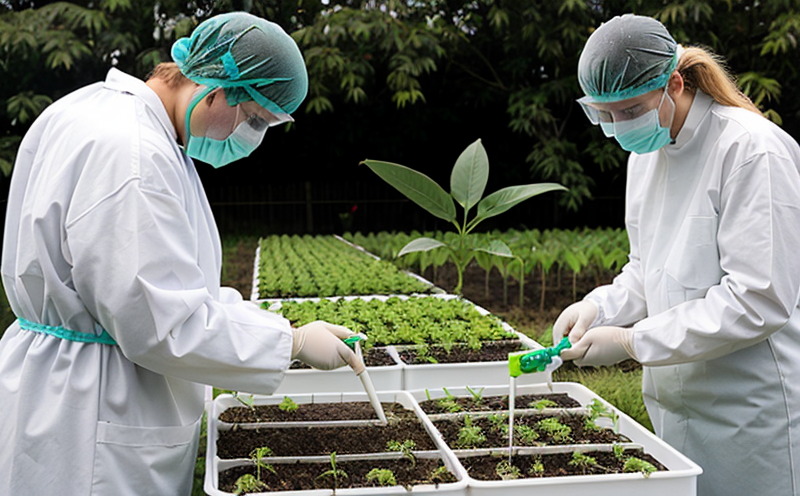Tobacco Mosaic Virus (TMV) Testing
The Tobacco Mosaic Virus (TMV), first identified in 1930, is one of the earliest viruses to be discovered. TMV can infect a wide range of plants but is particularly problematic for tobacco and other closely related crops like tomatoes, peppers, and snapdragons. This virus causes significant economic losses annually by reducing crop yields and quality due to distorted leaf shapes, yellowing, mottling, and stunted growth.
TMV testing is crucial in the agriculture sector as it helps growers identify infected plants early on. Early detection allows for targeted interventions such as quarantine measures or removal of affected plants before they spread the virus throughout a field. The accurate identification of TMV is also essential in international trade, ensuring that produce meets specific import and export standards set by various countries.
Testing methods have evolved over time from visual inspection to more advanced techniques like ELISA (Enzyme-Linked Immunosorbent Assay) and RT-qPCR (Real-Time Quantitative Polymerase Chain Reaction). These modern approaches provide greater sensitivity and specificity, enabling accurate diagnosis even when the virus is present in very low concentrations.
At Eurolab, our state-of-the-art lab uses cutting-edge technology to perform TMV testing. Our approach includes rigorous sample preparation procedures followed by precise analysis using validated protocols aligned with international standards such as ISO and ASTM. The results are reported promptly, providing actionable insights that can help stakeholders make informed decisions about their operations.
Our comprehensive service package ensures not only the technical accuracy of our analyses but also considers broader implications like cost-effectiveness and environmental sustainability. By partnering with us, businesses in the agriculture sector can enhance their competitive edge while contributing positively to sustainable agricultural practices.
Why It Matters
The significance of TMV testing cannot be overstated for several reasons:
- Economic Impact: TMV can lead to substantial financial losses due to reduced productivity and quality.
- Health Risks: In some cases, TMV-infected plants may produce toxic compounds that could affect human health.
- Trade Restrictions: Countries impose strict regulations on the movement of agricultural products to prevent the spread of diseases like TMV.
By implementing robust TMV testing protocols, growers can protect their investments and ensure compliance with regulatory requirements. This proactive approach fosters trust within supply chains and supports global trade.
Eurolab Advantages
Eurolab stands out in the field of TMV testing through its combination of expertise, advanced technology, and unwavering commitment to quality.
- Accurate Diagnostics: Utilizing ISO-compliant methods ensures precise identification of TMV.
- Rapid Turnaround Times: We pride ourselves on delivering quick results without compromising accuracy.
- Comprehensive Reporting: Detailed reports provide all necessary information for informed decision-making.
- Expert Staff: Our team comprises highly qualified professionals with extensive experience in agricultural testing.
Our clients benefit from these advantages, achieving better outcomes and enhanced efficiency across their operations. Partnering with Eurolab means gaining access to the latest technologies and practices, ensuring you stay ahead of industry trends.
Competitive Advantage and Market Impact
Eurolab's superior TMV testing capabilities offer several competitive advantages:
- Prompt Identification: Early detection of TMV leads to quicker containment, minimizing potential spread.
- International Compliance: Adherence to global standards ensures seamless trade across borders.
- Cost Efficiency: By preventing widespread infection, our testing reduces long-term management costs.
The market impact of accurate TMV testing extends beyond individual farms and businesses. It contributes to broader agricultural sustainability by promoting healthier ecosystems and supporting sustainable practices. Our services play a vital role in maintaining the integrity of global supply chains, ensuring consumers receive safe, high-quality products.





